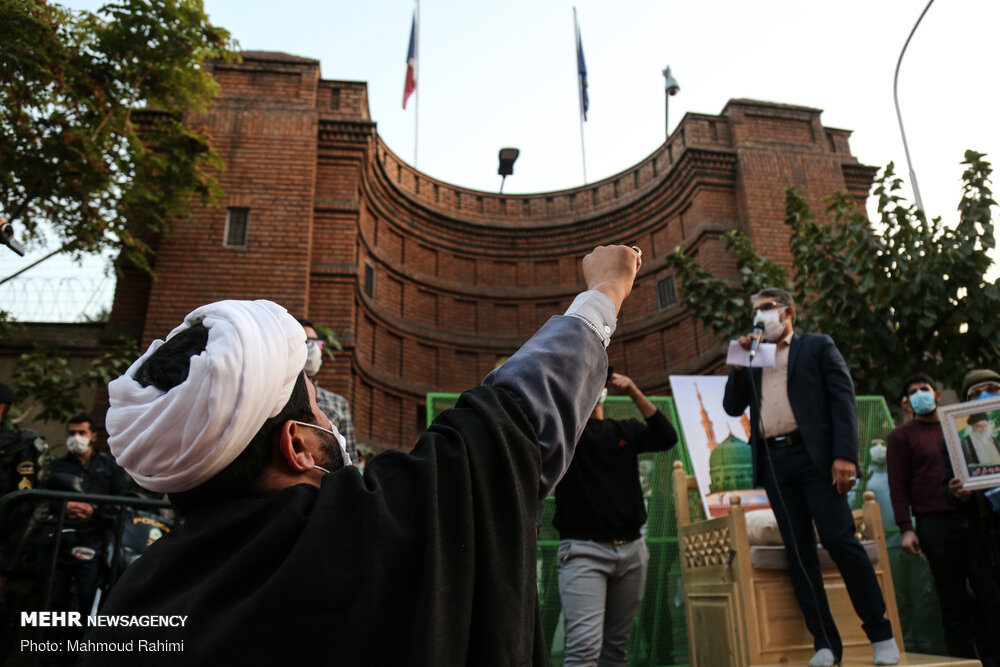October 30, 2020

France has erupted in criticism of Islam after a teacher was beheaded by a Muslim. The Islamic world has erupted in anger at France—but it is not the Islamic Republic that is leading the anger, instead it is Turkey and Iran has been left behind.
The Islamic Republic used to be the loudest Muslim state in responding to any perceived insults to Islam and led the vocal criticisms of such acts as publishing cartoons of the Prophet Mohammad in Europe or burning copies of the Qoran in the United States. Iran’s propensity to lead those movements began with its 1989 call for the murder of Salman Rushdie for writing “The Satanic Verses.”
But suddenly this has changed. The Islamic world is not paying any attention to Iran and its criticism of France. Instead, it is listening to Turkish President Recep Tayyip Erdogan as he says French President Emmanuel Macron “needs mental health treatment” and calls on Muslims to boycott French products.
Macron has said Islam is a religion “in crisis” because a militant minority is trying to take over the faith. But he has not attacked mainstream Islam. He spoke up after high school teacher Samuel Paty, 47, was beheaded October 16 after using some cartoons ridiculing Mo-hammad in a class lecture on freedom of expression. Macron defended freedom of speech and said France would not “give up” its cartoons.
Macron emphasized that he was not at war with Islam, but with a radical element of Islam that was trying to take over the faith and also, he said, trying to reverse France’s policy making secularism central to society.
Macron called for a strong assault on advocates of radical Islam, and followed up with raids on groups and even on private homes, with the seizure of literature advocating radical Islam and including videos of beheadings. News reports said the government was preparing to deport 213 foreign nationals on a government watchlist for allegedly holding extreme views. The Interior Ministry said that since January—long before the Paty killing—it has closed 73 mosques, private schools and workplaces “in the fight against radicalization.”
Erdogan and many others in the Middle East charged that Macron was attacking Islam—mainstream Islam.
In Iran, Foreign Minister Mohammad-Javad Zarif said, “Insulting 1.9 billion Muslims—and their sanctities—for the abhorrent crimes of such extremists is an opportunistic abuse of freedom of speech. It only fuels extremism.” After the later stabbing to death of three people in a church in Nice, Zarif spoke out again: “We strongly condemn today’s terrorist attack in Nice. The escalating vicious cycle—hate speech, provocations and violence—must be replaced by reason and sanity.” Zarif was thus one of the minority in the Middle East to condemn the violent reactions to Macron.
President Rohani followed up, saying, “Freedom can be useful to society when all values are respected—not by insulting a person to whom everyone is indebted.”
The day after that, Supreme Leader Ali Khamenehi issued a statement assailing France for allowing insults to be hurled at the Prophet while jailing people who question the Holocaust. He called Macron’s comments “stupid.” French law makes Holocaust denial a crime.
Rohani and Khamenehi did not condemn thre beheading or church murders.
The Iranian government has not so far joined Erdogan’s call for a boycott of French products.
Saudi Arabia has condemned the French cartoons and has also condemned the beheading of the school teacher. It has not called for any action against France.
The French Foreign Ministry, trying to counter the fury in the Islamic world, issued a statement saying the Macron Administration is “fighting against radical Islamism and doing so with the Muslims of France, who are an integral part of French society.”
Most political analysts think Macron has taken such a harsh stand against radical Islam for political reasons. In a recent poll, he is four points behind his likely rightwing opponent in the polls and is thought to be moving rightward to try to pull away some of her supporters.
In the past, Macron has usually sidestepped questions about Islam, avoiding playing to the bigoted. He has not joined in attacks on headscarves or halal school meals. Thus, politics is the most likely explanation for his sudden shift. Presidential elections are 18 months away.
Leaders in Germany, Austria and Greece have all expressed support for Macron.
In Russia, Ramzan Kadyron, leader of the Chechens, said Macron was helping radicalize people by insisting cartoons of Mohammad fall under free speech. “You are forcing people into terrorism, pushing people toward it, not leaving them any choice.”
Erdogan has made repeated speeches against Macron—and Europe—in recent days. He said Muslims living in Europe “are now subjected to a lynching campaign similar to that against the Jews in Europe before Word War II.”
In Tehran, 240 members of the 290-seat Majlis signed a statement blasting France for an “anti-human” stance and accusing Macron of being behind a wider plan against Muslims—a plan they did not detail.
All across Europe, not just in France, the infamous cartoons are seen as a fundamental element of free speech. In the United States, however, no mainstream publication has carried the cartoons. In the US, journalists agree there is a right to print the cartoons, but US journalism sees cartoons or editorials demeaning an ethnic or religious group as at best tasteless, if not unethical.
The high school teacher was attacked by an 18-year-old Chechen immigrant, Abdoul-lakh Anzorov, who had lived in France since the age of six and whose entire education was in the French system of secularism. Paty, the teacher, had not used the cartoons to advocate an anti-Islamic argument, but rather to illustrate the issue of freedom of expression.